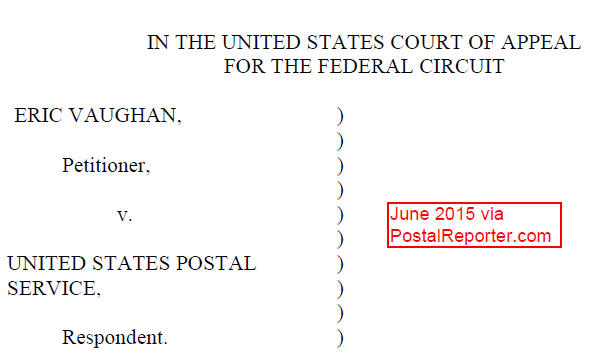 Federal Court rejects Postal Supervisor’s attempt to reinstate appeal. Postal Supervisor did not present any evidence to establish that bipolar disorder impaired his decision-making capability.
Federal Court rejects Postal Supervisor’s attempt to reinstate appeal. Postal Supervisor did not present any evidence to establish that bipolar disorder impaired his decision-making capability.
The facts collected from several cases are as follows:
June 04, 2015 – On July 7, 2010, Eric Vaughan was removed from his position as Postal Supervisor, Distribution Operations, EAS-17 at the Processing and Distribution Center in Brooklyn, New York. Vaughan was fired for “improper conduct unbecoming a postal supervisor when he engaged in a physical altercation with his subordinate.”
Vaughan appealed the removal action to the Merit System Promotion Board (MSPB) shortly thereafter. The matter was resolved by settlement agreement, under which the Postal Service agreed to rescind the removal and permit Vaughan to resign from his position. In exchange, Vaughan would receive a modest lump-sum payment of $2,500 in lieu of back pay, and he would surrender his right to challenge the circumstances of his resignation. By entering into the settlement agreement, Vaughan also waived his right to seek employment again at the Postal Service, he acknowledged (and understood) the final and binding effect of the agreement, and attested that he was entering into the agreement voluntarily. Vaughan executed the settlement agreement and voluntarily resigned, indicating that he was resigning due to “personal reasons.”
In September 2014, approximately four years after Vaughn’s first appeal was settled, Vaughan filed a second appeal with MSPB challenging his July 2010 removal. MSPB issued a show cause order indicating that prior to initiating this action, Vaughan had entered into a settlement agreement waiving future appeal rights. Vaughan responded that, on the date of the altercation, he was suffering from the effects of his bipolar disorder. He also indicated that during the pre-hearing conference prior to his appeal, he felt coerced into signing the settlement agreement because the administrative judge advised him that a videotape of the altercation “speaks a thousand words.”
In an initial decision the MSPB administrative judge found that Vaughan did not show “a non-frivolous allegation that the waiver of his appeal rights should not be enforced pursuant to the terms of the settlement agreement.”
The MSPB administrative judge concluded that the settlement was voluntary because Vaughan accepted the lump
sum payment and signed a resignation form, and because the settlement agreement indicates that Vaughan
understood and agreed to sign the agreement of his own free will. The MSPB administrative judge found that
Vaughan’s coercion claim lacked merit, and that his “signature on the [settlement] agreement is evidence of
his conscious and voluntary waiver of his Board appeal rights.” Thus, the administrative judge dismissed the appeal for lack of jurisdiction. Vaughan did not file a petition for review of the administrative judge’s decision. As a result, the decision became the final decision of the MSPB.
On appeal, Vaughan argues that he did not voluntarily execute the settlement agreement because of his
disability, and because he was informed by the administrative judge via telephone that a video recording of the
incident giving rise to the removal “spoke a thousand words.”
Vaughan failed to present sufficient evidence to establish that any disability he may have had impaired
his decision-making capability at the time the settlement agreement was executed . The plain language of the settlement agreement establishes that Vaughan “acknowledges that he is . . . mentally competent to execute” the agreement, and “that he has entered into this Settlement Agreement freely, knowingly, voluntarily, and without coercion, threat or duress.” Moreover, Vaughan accepted the benefits provided to him under the settlement agreement, including a modest lump-sum payment, and submitted a signed resignation form. The MSPB administrative judge’s finding that such behavior is indicative of his voluntary acceptance, is supported by substantial evidence. Thus, the MSPB Board properly dismissed the appeal.
The court considered Vaughan’s remaining arguments and found them unpersuasive.
[gview file=”http://www.postal-reporter.com/blog/wp-content/uploads/2015/06/15-3056.Opinion.6-2-2015.1.pdf”]
good……and I hope his lawyer is laughing all the way to the bank from the money he got from this dolt!
The supervisor’s argument on his bipolar disorder would have had a chance of winning with medical reports. But this argument is hard to present without an attorney.
I read this sucka tried to get another management job outside the post office with a fancy resume proclaiming his accomplishments in the post office(LOL).
How convenient it is 2 claim disability as an excuse 4 a fight. Whatever his problem, he should had FMLA and just stayed away?